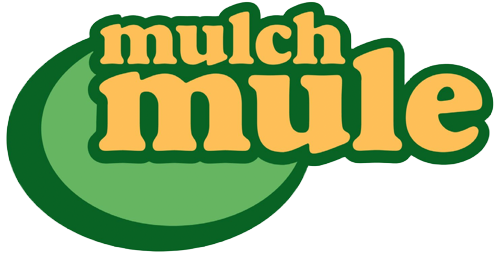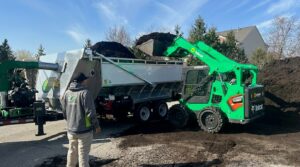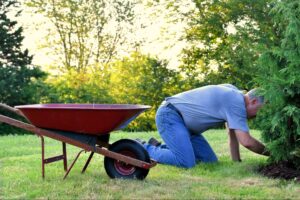Effective transportation is the lifeblood of a successful landscaping business. It doesn’t matter how skilled your crew is or how advanced your tools are—without safe and efficient transportation practices, operations are prone to delays, damage, and increased costs. By adopting proven strategies and leveraging purpose-built equipment like the Mulch Mule Trailer, you can protect your assets, enhance safety, and improve profitability.
This guide explores practical tips for transporting landscaping materials and equipment securely, while offering insights into how innovative solutions can streamline workflows and help landscaping professionals reduce labor costs and boost productivity. Whether you’re hauling heavy mulch or delicate equipment, these strategies will help you maintain efficiency and safety on every job site.
Why Safe Transportation Is Crucial in the Landscaping Industry
In the landscaping industry, transporting essential materials and equipment is a daily necessity—but it’s often overlooked as a critical element of success. Moving heavy mulch, soil, plants, and specialized tools comes with inherent risks, from workplace injuries to equipment damage or delays that can derail project timelines. Poor transportation practices don’t just affect safety—they impact profitability, employee well-being, and a company’s reputation.
Adopting safe transportation practices isn’t optional; it’s fundamental to maintaining an efficient, productive operation. Beyond just loading and hauling, it’s about ensuring materials and equipment arrive intact, minimizing risks for employees, and avoiding costly accidents. Additionally, innovative tools like the Mulch Mule Trailer, with its automated loading and unloading capabilities, can be game-changers. By pairing advanced equipment with proven safety strategies, landscaping professionals can not only reduce labor costs but also improve workplace efficiency, making each project smoother and more profitable.
Key Challenges in Transporting Landscaping Materials and Equipment
Transporting landscaping materials and equipment efficiently and safely involves overcoming various challenges that can affect your business’s operations. These challenges, if not properly managed, may lead to project delays, increased costs, and safety hazards. Ensuring that materials and equipment are handled correctly is vital to maintaining productivity, minimizing risks, and safeguarding your investment. Here is a detailed look at some of the primary challenges faced by landscaping professionals and how they impact the transportation process:
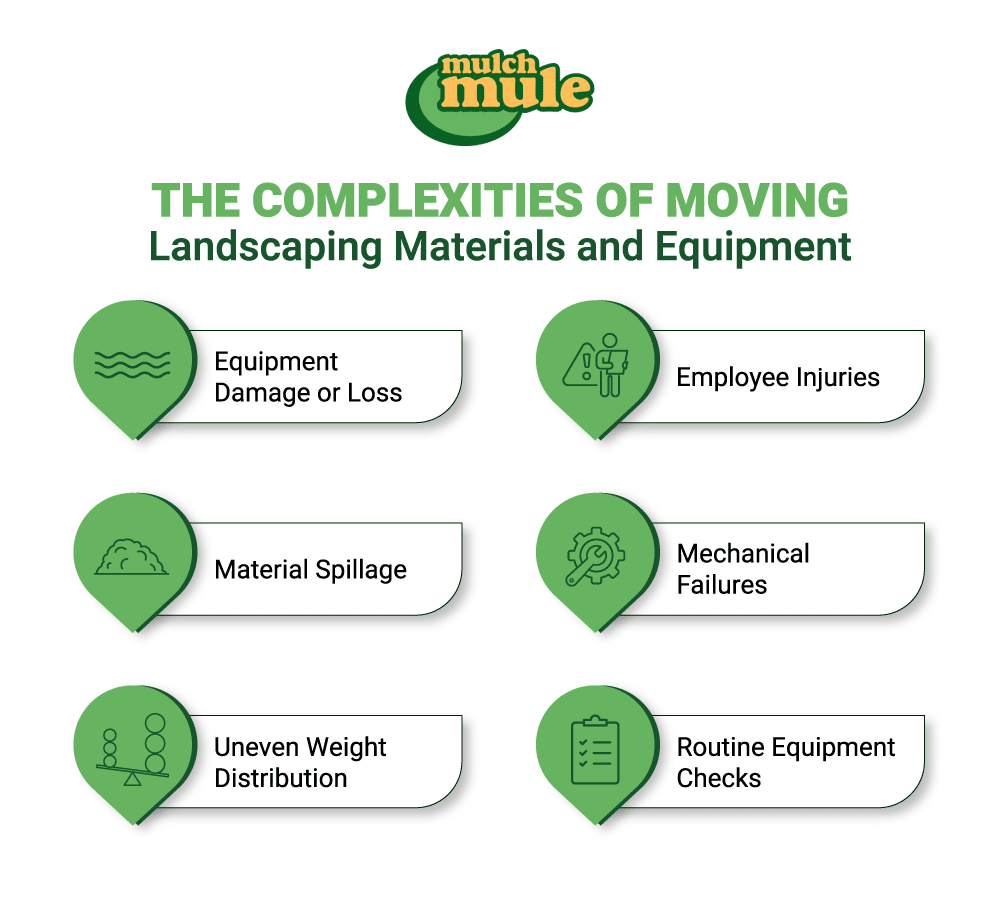
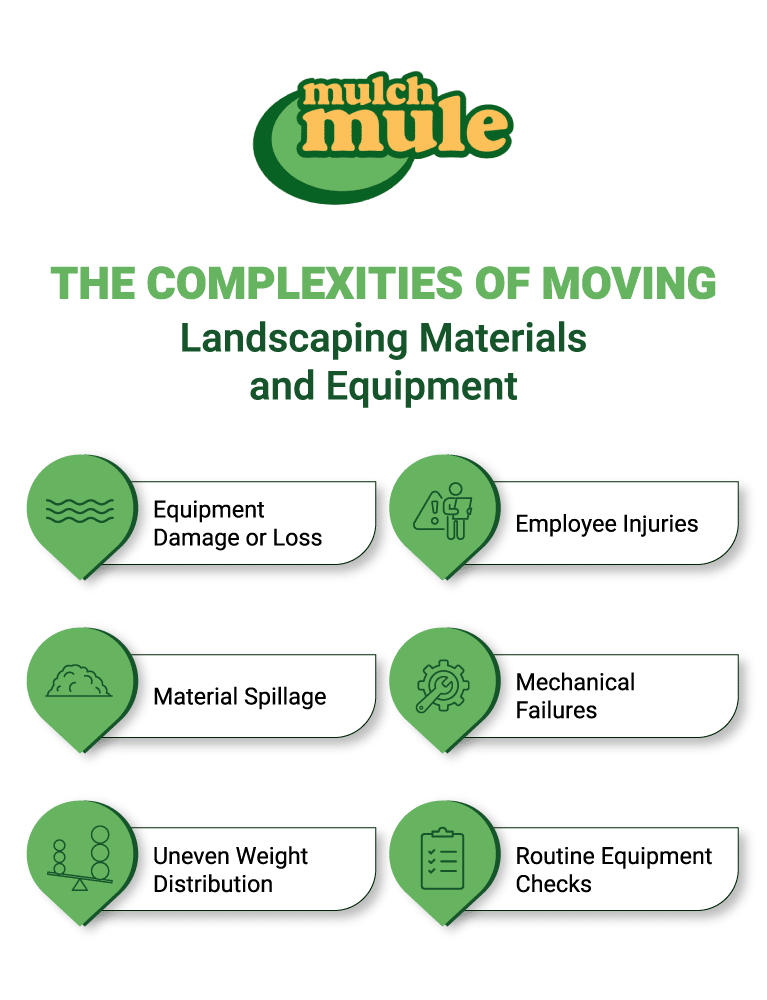
- Equipment Damage or Loss
- Causes: Improperly secured items can shift, fall, or collide during transit.
- Consequences: Leads to costly repairs or the complete loss of valuable equipment like mowers, trimmers, and loaders.
- Solutions: Utilize high-quality fasteners, straps, and cages to secure items firmly during transport.
- Material Spillage
- Causes: Materials such as mulch, soil, or gravel can spill from uncovered trailers due to movement and wind.
- Consequences: Results in wasted materials, creates road hazards, and potential legal liabilities.
- Solutions: Use tarps or specialized covers to secure loose materials effectively.
- Uneven Weight Distribution
- Causes: Incorrectly loaded trailers or overcapacity can lead to imbalance.
- Consequences: Affects vehicle stability, increasing the risk of accidents and vehicle control issues.
- Solutions: Organize loads evenly to distribute weight uniformly and avoid exceeding weight limits.
- Employee Injuries
- Causes: Poor loading practices and unsafe handling techniques.
- Consequences: Result in injury, impacting employee well-being and workforce productivity.
- Solutions: Implement comprehensive safety protocols and provide training for safe equipment handling and loading.
- Mechanical Failures
- Causes: Skipped or neglected routine maintenance on vehicles and equipment.
- Consequences: Leads to unexpected breakdowns, delays, and safety hazards.
- Solutions: Conduct regular maintenance checks and prompt repairs to ensure machinery operates smoothly.
Successfully addressing these challenges requires a proactive approach to transportation management in the landscaping sector. By employing preventative measures, such as using covers for loose materials and ensuring regular vehicle maintenance, businesses can maintain operational efficiency, protect their assets, and foster a safe work environment. Overcoming these transportation-related obstacles will not only bolster productivity but also safeguard your reputation within the industry.
Benefits of Prioritizing Safe Transportation Practices
Making safe transportation a priority provides landscaping businesses with significant advantages beyond just moving materials from point A to point B:
- Fewer Accidents and Lower Costs: Adopting safe practices minimizes the risk of injuries and accidents, reducing expenses related to property damage and insurance.
- Enhanced Efficiency: Reliable transport practices keep projects on schedule. When items are secured with robust measures—using heavy-duty straps—job sites operate more productively.
- Asset Protection: Proper procedures prevent unnecessary wear and tear on valuable equipment.
- Employee Morale: Investing in safety helps ensure that workers remain injury-free, boosting team confidence and well-being.
Coupling these benefits with a material management strategy—such as ensuring loads stay within safe capacities and grouping materials strategically—positions your business for long-term success.
Best Practices for Safely Transporting Landscaping Materials
Transporting landscaping materials requires careful planning and precision. Here are essential practices to follow:
Properly Secure Materials to Prevent Movement
One of the biggest risks is shifting material during transit.
- Invest in Tie-Downs: Use dependable fasteners like tie-downs to secure your load.
- Double-Check Everything: Always verify that every connection is locked in place before taking off.
- Don’t Exceed Weight Limits: Stay within recommended capacities so your trailer remains stable on the road.
Weatherproof Your Materials
Weather can compromise material quality.
- Using Tarps and Covers: Secure your load with a durable tarp and weather-resistant covers.
- Fasten Covers Securely: Ensuring covers remain tight is key, especially in windy or rainy conditions.
Organize Loads for Safe Transport and Efficient Unloading
A well-organized load simplifies transport.
- Distribute Weight Evenly: A balanced load is key for stability.
- Keep Clear Pathways: Plan clear access routes on your trailer for efficient unloading.
Prioritizing these best practices not only minimizes the risk of accidents and damage but also maximizes operational efficiency, contributing to smoother workflows. By consistently applying these strategies, businesses can protect their assets, enhance safety, and ensure timely project completion, fostering a reputation as a reliable and professional service provider.
Guidelines for Safely Transporting Landscaping Equipment
Moving equipment such as mowers, aerators, and sprayers requires a detailed approach to keep both employees and machinery safe. A proactive approach to maintenance not only extends equipment lifespan but also improves overall safety.
Routine Inspections and Maintenance
Regular inspections ensure vehicles and equipment remain roadworthy.
- Ensure Warranty Compliance: Stick to manufacturer recommendations so your equipment remains under warranty.
- Routine Maintenance: Conduct frequent checks for wear and tear.
- Routine Inspections: Adhere to scheduled routine inspections.
- Verify Towing Connections: Always confirm that the hitch assembly and safety chains are properly secured.
Safe Loading and Unloading Practices
Efficient techniques reduce risk during material and equipment handling:
- Employee Training: Train your team in proper lifting and handling methods.
- Proper Lifting Techniques: Reinforce safe practices by teaching proper lifting techniques.
- Use Ramps or Mechanical Aids: Consider adding ramps or mechanical aids for smoother, streamlined loading.
Incorporating these guidelines into your daily routines is essential to preserving the safety of your crew and the integrity of your equipment. By focusing on consistent maintenance practices and implementing safe loading techniques, landscaping businesses can reduce downtime and prevent costly equipment failures. Ensuring your team understands the importance of these measures fosters a culture of safety and reliability, ultimately enhancing the efficiency and reputation of your services.
Enhancing Efficiency and Productivity During Transportation
Efficiency is vital to the long-term success of any landscaping operation. Streamlined processes help ensure that materials and equipment reach job sites without delay:
- Streamlined Processes: Plan routes and schedules in advance, ensuring vehicles take the most efficient paths to job sites.
- Labor Efficiency: When loads are secured and organized, crews can work faster and more safely.
- Project Timelines: Faster loading and unloading contribute to on-time project delivery, improving customer satisfaction and reducing labor overruns.
Incorporating advanced vehicles and equipment, such as the Mulch Mule Trailer with its automated features, can drastically reduce loading times and streamline operations. Additionally, integrating technology such as GPS tracking systems and route optimization software can ensure that materials and personnel arrive at their destinations more efficiently. By adopting these modern tools and techniques, landscaping professionals can enhance productivity, minimize downtime, and ultimately, deliver superior results to their clients, strengthening their reputation and profitability in the competitive landscaping industry.
Moving and distributing materials is a labor-intensive task. The Mulch Mule is designed from the ground up for management of all types of bulk material and engineered to efficiently automate those back-breaking tasks. Watch the video below to learn how Mulch Mule can take the load off your employees and pay for itself in the long run by increasing overall profits for your business over time.
Year-Round Landscaping Transportation Considerations
Landscaping operations often continue throughout the year, regardless of the season. Ensuring your transportation practices adapt to varying weather conditions can safeguard materials, protect equipment, and maintain productivity:
- Winter Readiness: For those offering snow removal or winter landscaping services, ensure your trailers and vehicles are equipped to handle snow, ice, or freezing temperatures. This can involve using specialized tires, checking tire pressure routinely, and applying anti-icing agents to ramps.
- Seasonal Attachments: Different times of year may require specific attachments or upgrades. For example, some businesses might want to consider equipment that offers a leaf vacuum attachment for leaf cleanup in the fall with the ability to remove it when the focus in spring is mulch or rock distribution.
- Flexible Loading Practices: Be prepared to deal with varying material types—including wet, heavier mulch in spring or lighter, dry materials in summer. Adjust your securing techniques accordingly to prevent shifting loads or potential spillage.
- Employee Safety Protocols: Longer shifts during peak seasons or reduced daylight hours in fall and winter necessitate clear safety guidelines. Equip crews with the right gear for changing weather conditions, and schedule mandatory breaks to reduce fatigue.
By incorporating seasonal considerations into your transportation approach, your landscaping business remains agile and capable of taking on projects year-round, all while preserving safety standards.
Discover How Streamlined Equipment Can Transform Your Business
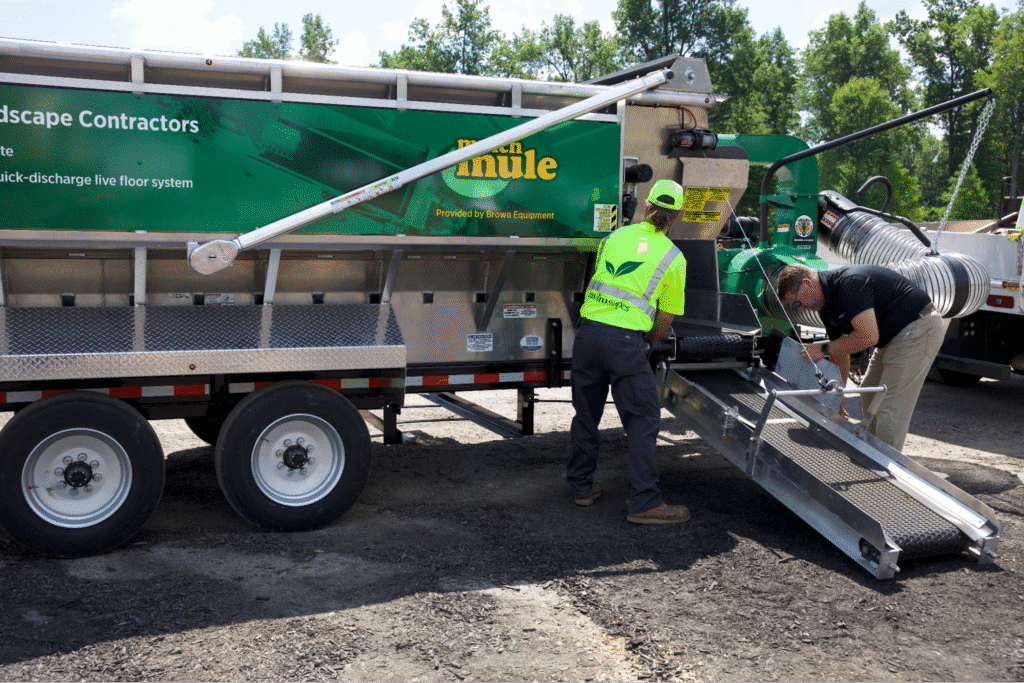
Safe transportation in the landscaping industry is more than just a logistical necessity—it’s a cornerstone of operational success.
Implementing these best practices—from effectively securing loads and balancing weight to ensuring thorough inspections—protects your investments and fosters a safer work environment for your team. Using advanced equipment can further optimize your operational efficiency by speeding up loading and unloading tasks. Combined with consistent maintenance routines, this approach ensures your team is always ready for the next job.
Contact Mulch Mule today for more insights on how Mulch Mule’s equipment can transform your landscaping operations.
